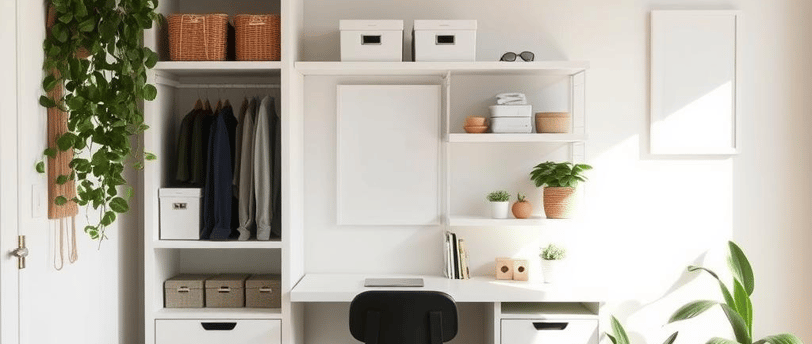Declutter Your Space: A Tidy Space Leads to a Clear Mind
🧘WELLNESS TIPS😌 STRESS MANAGEMENT & EMOTIONAL BALANCE


In the fast-paced world we live in today, the significance of having a clean and organized environment can’t be overstated. Clutter isn't just a physical burden; it extends into our mental space, influencing our emotions, productivity, and overall well-being. The notion that a tidy space leads to a clear mind isn’t just a cliché; it’s deeply rooted in psychological studies and universal experiences. In this article, we will explore the profound impact of decluttering our environments and practical strategies to create a serene and organized space.
The Psychological Effects of Clutter
Clutter can be overwhelmingly distracting and stressful, leading to a phenomenon that researchers term "cognitive overload." Our brains are wired to respond to chaos, which can cause heightened anxiety and reduced focus. When we’re surrounded by clutter, it can be challenging to concentrate on tasks or enjoy our downtime. A study published in the Personality and Social Psychology Bulletin discovered that individuals with cluttered homes were more likely to feel overwhelmed, less productive, and even frustrated compared to those who maintained a clean environment.
Decluttering our physical surroundings can have an immediate effect on our emotional state. A tidy space offers a sense of control and accomplishment, fostering feelings of clarity and tranquility. This transformation transcends the physical aspect–a decluttered room can lead to a decluttered mind. The link between organized spaces and mental well-being is a powerful motivator for those looking to improve their quality of life.
The Benefits of Decluttering
1. Enhanced Productivity
One of the most immediate benefits of decluttering is an increase in productivity. When your surroundings are organized and neat, focus and efficiency can flourish. A study by the Princeton University Neuroscience Institute found that physical clutter can negatively impact our ability to focus, making it difficult to concentrate on the task at hand. By removing distractions, you can channel your energy into the essential tasks that matter most.
2. Reduced Stress and Anxiety
Living or working in cluttered spaces can lead to increased stress levels. The visual chaos creates a constant state of activation in the brain, fueling feelings of anxiety. In contrast, a tidy space promotes relaxation and comfort; it serves as a retreat from the chaos of daily life. By decluttering, you essentially create a sanctuary that nurtures mental peace, making it easier to unwind and recharge.
3. Improved Creativity
Ironically, while some believe that clutter can spark creativity, the opposite often holds true. A disorganized environment can stifle innovation and block creative flow. When everything is in its place, your mind can roam freely, unburdened by distractions, allowing for greater creativity and better problem-solving abilities. Many artists and thinkers have emphasized that a clean workspace enhances their capacity to create.
4. Fostering a Positive Lifestyle
Decluttering is more than just clearing physical space; it often inspires a more mindful way of living. When you prioritize what you keep in your space, you become more intentional with your choices. This process can lead to healthier habits, such as easier meal preparation when your kitchen is organized or a more inviting atmosphere for guests when your living spaces are tidy.
5. Improved Relationships
Decluttering your space can also positively affect your relationships. A disorganized home can lead to frustration and stress not just for you but for family members and roommates as well. By creating a clean and welcoming environment, you contribute to a more harmonious atmosphere that encourages interaction, conversation, and peace.
Practical Steps to Declutter Your Space
Now that we've highlighted the benefits of decluttering, let’s explore some practical steps for achieving a calmer, clearer environment.
1. Start Small
Begin with a small area–perhaps a single drawer, a desk, or a corner of a room. Focusing on manageable sections will prevent overwhelm. As you complete each small task, celebrate your progress, and motivate yourself to tackle larger spaces.
2. Set Clear Goals
Determine what you want to achieve with your decluttering. Do you want a more spacious home or a more organized workspace? Having clear goals in mind can help guide your decluttering process and keep you focused on the outcome.
3. Follow the One-Year Rule
When deciding what to keep or discard, consider the one-year rule: if you haven’t used or worn it in the last year, it’s likely time to let it go. This rule helps eliminate items that occupy space without serving any purpose.
4. Categorize Items
Create designated categories for your items, such as 'keep', 'donate', 'sell', and 'throw away'. This practice will clarify what you truly value and help you make conscientious choices as you declutter.
5. Establish a Regular Routine
Make decluttering a regular part of your life. Set aside time each week or month to revisit your spaces and keep them organized. By making decluttering a habit, you’ll prevent clutter from building up again.
6. Use Storage Solutions
Make use of storage bins, organizers, and shelves to keep items neat and accessible. An organized storage system can transform even the smallest spaces into functional areas.
7. Seek Support
If you find decluttering overwhelming, consider seeking support from friends or professionals who specialize in organizing. Sometimes, an outsider’s perspective can provide motivation and guidance.
Conclusion
Decluttering is a vital practice in our lives that transcends mere aesthetics; it’s essential for mental and emotional well-being. A tidy space is a conduit for clarity, productivity, and creativity. By adopting effective decluttering strategies, we can create environments that not only look good but feel good, ultimately leading to a clearer mind and a more fulfilling life. Embrace the journey of decluttering—your mental state and overall well-being will thank you for it.
